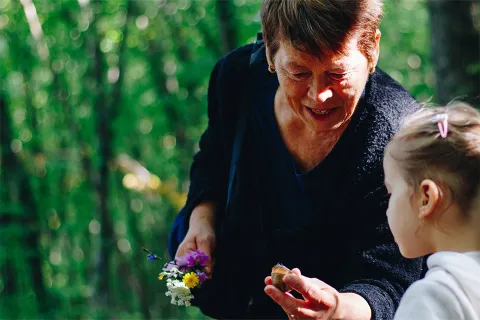New action guide empowers people with dementia

More than 597,000 Canadians are living with Alzheimer's or another form of dementia, and yet big gaps remain in healthcare support. It’s estimated that 85 per cent of people living with dementia are not receiving support after their diagnosis. And research shows being engaged in community is one of the biggest factors in slowing the condition’s progression.
One B.C.-based group of people living with dementia came together as an action group to make an impact in creating further support. Working with UBC researchers, they developed a groundbreaking anti-stigma toolkit that is listed by the World Health Organization as one of the top 10 inclusion tools in the world.
Now they’ve written a guide for people with dementia to create their own action groups to make changes in their community, reduce stigma and promote inclusion.
The group is led by primary investigators Dr. Alison Phinney, a School of Nursing professor within the Faculty of Applied Science, Dr. Deborah O’Connor, a professor at UBC’s School of Social Work, and Jim Mann, who has been living with dementia for 17 years.
We sat down with Phinney (AP) and Mann (JM) to talk about how the action guide can be used to advance community engagement for people living with dementia, empowering them to reclaim their lives as full social citizens.
What inspired your group to write an action guide for people looking to pursue community projects involving stigma and dementia?
JM: Two years ago, our group launched the Flipping Stigma Toolkit to help people to identify stigma around dementia and respond to it in healthy ways. The work attracted attention in more than 53 countries and enhanced educational curriculums in universities, community centres, neighbourhood houses, churches and other community-based organizations. By creating a complementary action guide and sharing our experiences building the toolkit, we hope to encourage other groups that may be looking to pursue similar projects.
AP: The Flipping Stigma action guide is designed to provide direction for future projects and collaborations. It recommends a step-by-step process for building an advocacy-focused action group as well as suggested principles to ensure these groups succeed in their objectives. These guidelines include consistently engaging and encouraging members to participate, keeping an open mind in meetings and engaging with the broader community, including people with dementia.
As for what a group like this might decide to work on, the possibilities are endless. They could create a dementia café in their community, build a stigma awareness campaign on social media, offer education sessions about dementia at local rec centres, or form intergenerational storytelling groups in local schools. Whatever the initiative, the organizing principle here is to create positive change in society and work together with a shared sense of purpose.
Who can benefit from using the action guide?
JM: Anyone interested in developing a research project or community intervention may find this useful, be they someone with dementia, a caregiver or a member of the community who sees a need. The guide is meant to give you a sense of what’s most important when starting work on something like this.
AP: The action guide can be viewed online or accessed as a PDF or printed book at no cost. It is designed to be both inspiring and practical, so people living with dementia can see how they can help lead this work in meaningful ways.
Any other thoughts?
AP: Worldwide, at least 44 million people are living with dementia, including an estimated 70,000 in B.C. alone. As these numbers are expected to grow, it’s crucial to explore other methods to support the personhood and social citizenship of older people, especially those living with dementia and their families. We hope that the tools the Flipping Stigma group has created will contribute in some measure in this effort.
JM: Working on this project and this guide has been deeply fulfilling. The momentum we achieved is really something to be proud of. There is much room for growth in our society to become a totally dementia-friendly society, and this guide goes a long way towards making that happen.


